While in Sydney recently I decided to make a day trip to the South Coast. My ignorance of this area was almost complete – I had never visited or otherwise sought out information. The only things I really knew was that it has a railway and a lot of beautiful scenery.
What I did come across was the series of abandoned rail tunnels. There were eight tunnels originally built in 1888 for the Illawara and South Coast Line.
Despite an announcement in 2017 that the tunnel was to be converted to a bicycle path by 2021, this has evidently not happened.
My trip into the tunnel
I caught the train down to Otford Station, located in an idyllic position surrounded by lush bushland. It’s a really pretty station that’s worth a trip in its own right. To a Victorian, it’s an odd sight to see electric wires over a railway outside of a built-up area.

On the south side of the station there is a track leading to Station Road and the wider road network.
But there is a little gap in the bushes that goes closer to the railway. It’s literally a very small opening – blink and you’d miss it.
View Larger Map
Just as I approached I came across a local who was walking the other way. We had a chat and I asked her about the tunnel and if the residents mind people coming to have a look. She told me that it wasn’t an issue and even gave me some tips and directions on how to find the entrance.
Armed with this new information, I set out down the path.
The first section is almost walking through the backyards of a couple of houses. Here you can see the first signs of the former rail alignment, including a surprising amount of abandoned infrastructure.

Some enterprising gardeners have repurposed some wooden sleepers in interesting ways.
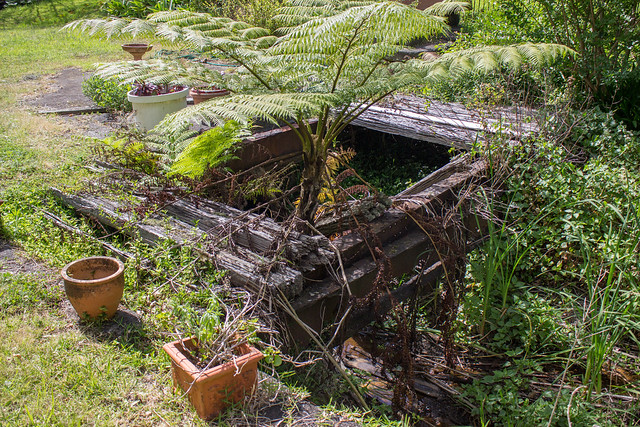
Bashing through some more weeds further along finally revealed the entrance to the tunnel.
The concrete pads built during the Second World War as an access road are still here. A lot of the original brickwork around the arch is now covered by vegetation and the gate aimed at preventing access (I think?) is a bit worse for wear. Moreover, the gate was wide open.
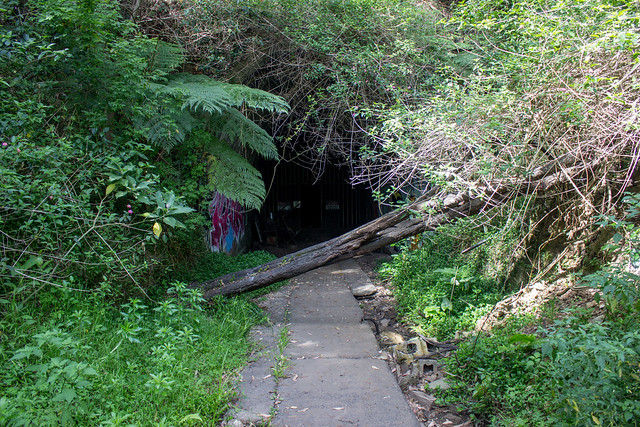

The first of many random pieces of old machinery are located right outside the gate.
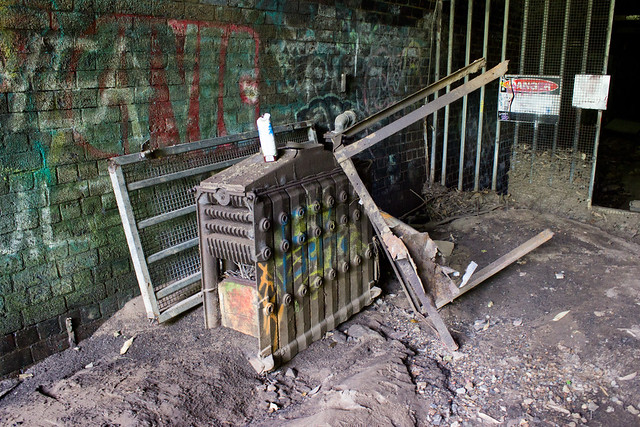
After more poking around the front entrance, I finally stepped inside.
It was a reasonably warm day outside and you do immediately feel the cooler air from underground. Even a few steps inside makes a big difference. But that’s not the main thing that you notice.
You really get a sense here of the tunnel’s darkness and vastness. You stand inside in front of this complete blackness. Absolutely nothing is visible ahead. It’s very eerie.
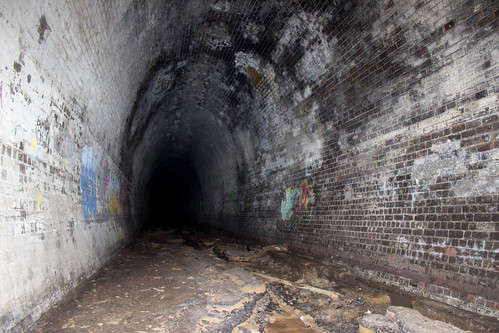
After a brief discussion with myself on the wisdom of continuing, I set out on my 1.6 kilometre journey into the abyss.
Other than the all-consuming darkness the first thing that you notice is the sound inside. It’s absolutely silent except for the noise of running water from the small creek that runs from the north to the south end on account of the slope.
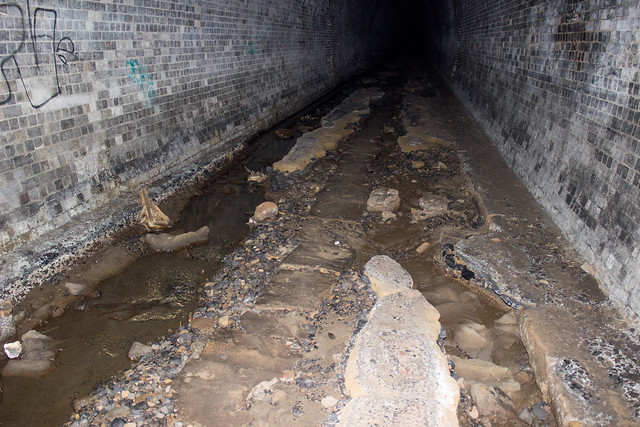
As usual with these kinds of places there have been various claims about the tunnel being haunted. This is of course utter rubbish but I can understand how someone might arrive at this conclusion. The combination of the running water and the echoes permeating through the tunnel at certain points do make sounds very much like distant murmurs. I’ll admit that it did make me stop and think until I figured out the source of the noise.
Another thing to note is the unevenness of the ground. Most of the original brickwork appears to have been covered in concrete at some point. But time and the creek have eroded significant parts and it is difficult to find steady footing – even with a torch. There are also large and very clear pools of water that you could easily fall or step into if you are not careful.
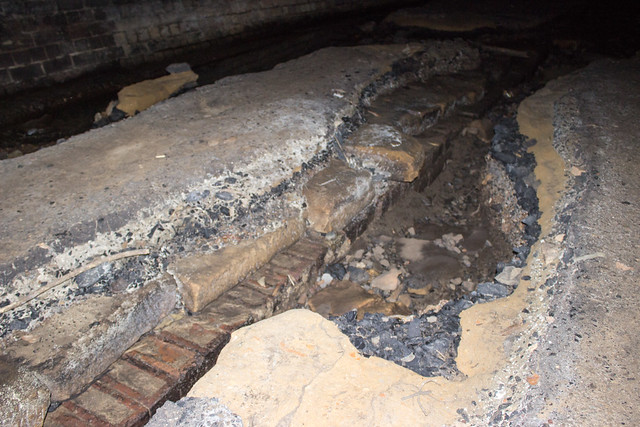
The route of the tunnel means that it feels a lot longer than its actual size if you travel from north to south like I did. About 90 percent is completely straight which means that you are walking into absolutely pitch black darkness for almost the entire way – makes it feel like you’re heading ever deeper into an endless void.
Then a sudden, blinding light appears after what seems like much longer than the 30 minutes you’ve taken to get this far. It’s around the bend in the tunnel as it begins to curve westwards back towards what is today the main railway. Only here can you almost see both ends of the tunnel and get sense of its length.

In terms of sights to see this tunnel has a wide variety.
The most common is the various graffiti and artwork throughout. I assume that the length of the tunnel and effort required to get inside to any decent length deters most taggers. This means that most of the wall art is of higher quality than your typical back laneway in the suburbs.
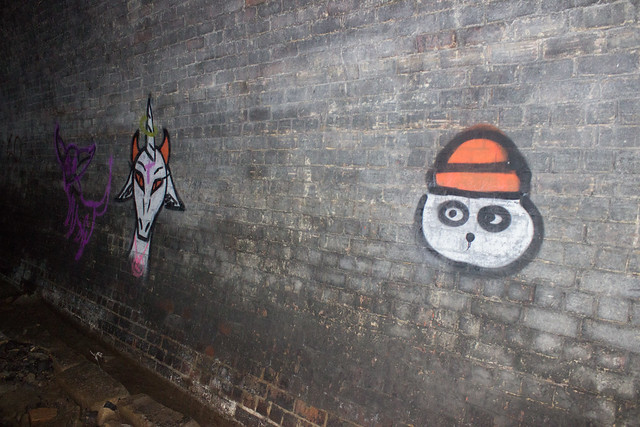
I enjoyed a lot of these pieces along the way as they add quite a bit to the experience of walking through the tunnel. Most make direct references to the tunnel or make clever use of their surroundings – like this one at the northern tunnel portal greeting travellers with “You made it”
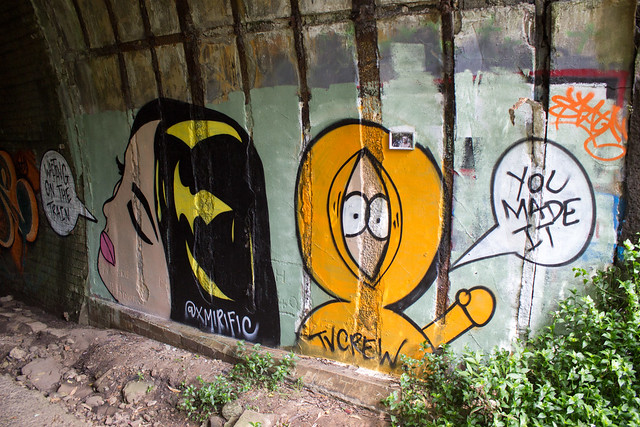
Other things to see include that random pieces of old machinery and – frankly – rubbish strewn throughout. Most of this appears to be from when the tunnel was used for mushroom farming from 1959, including large beetle-looking tractor towards the middle.

There is also a ventilation shaft that was built in 1891 to improve the tunnel’s air quality and temperature about halfway through. It’s the only place where you get an idea of how deep you are inside the rolling hills of Illawarra because you can look straight up and see a tiny speck of daylight.

Unfortunately due to its age and many different uses there aren’t that many traces of the railway left. There are of course little refuges cut into the wall at regular intervals and you can see many traces of the smoke from steam locomotives etched into the bricks.
The only thing that I could find that may be a remnant of the actual railway as this long piece of track at the southern tunnel portal. However, I have no idea if it is from this or some other railway.
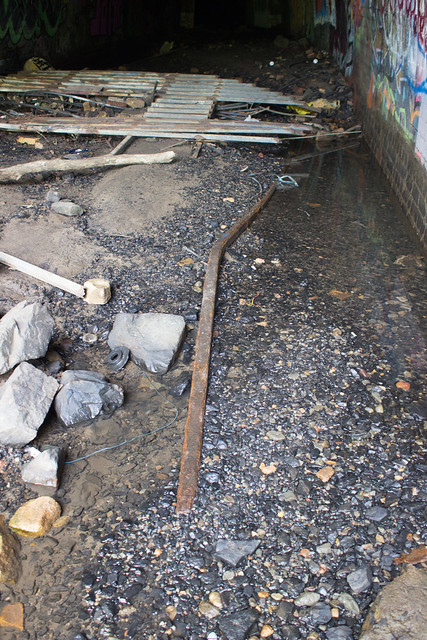
The final main point of interest is close inside the southern tunnel portal. During the Second World War the Australian Army used part of this section to deliberately collapse part of the roof using explosives. The experiment was ostensibly to test blocking access to tunnels to hold up an invading army. But at this stage of the war I don’t think that simply ‘blowing stuff up’ can’t be discounted for at least part of the reason.
The section was repaired some time afterwards with a concrete archway which is still there today. Its design means you can very clearly see the extent of the roof collapse and rubble above.

My tips for visiting
From what I’ve seen online subsequent to my trip, most people go into the tunnel for a short while but don’t make it all the way through.
If you are game and want to try this for yourself, I would highly recommend bringing a torch and at least one backup light source. It’s absolutely pitch black for 95% of the way. If you lose light, you will simply not be able to walk through safely given the condition of the ground.
I absolutely would not recommend attempting the tunnel if you have claustrophobia.
There is also no mobile reception anywhere – except for a very weak signal at the midway point underneath the ventilation shaft. Don’t follow my bad example and explore on your own because if something happens to you, there is no way of contacting the outside world. Hardly anyone uses the tunnel so it could be hours or even days until you are found.
The air quality inside is very good. Probably due a combination of the ventilation shaft and the coastal winds in the vicinity.
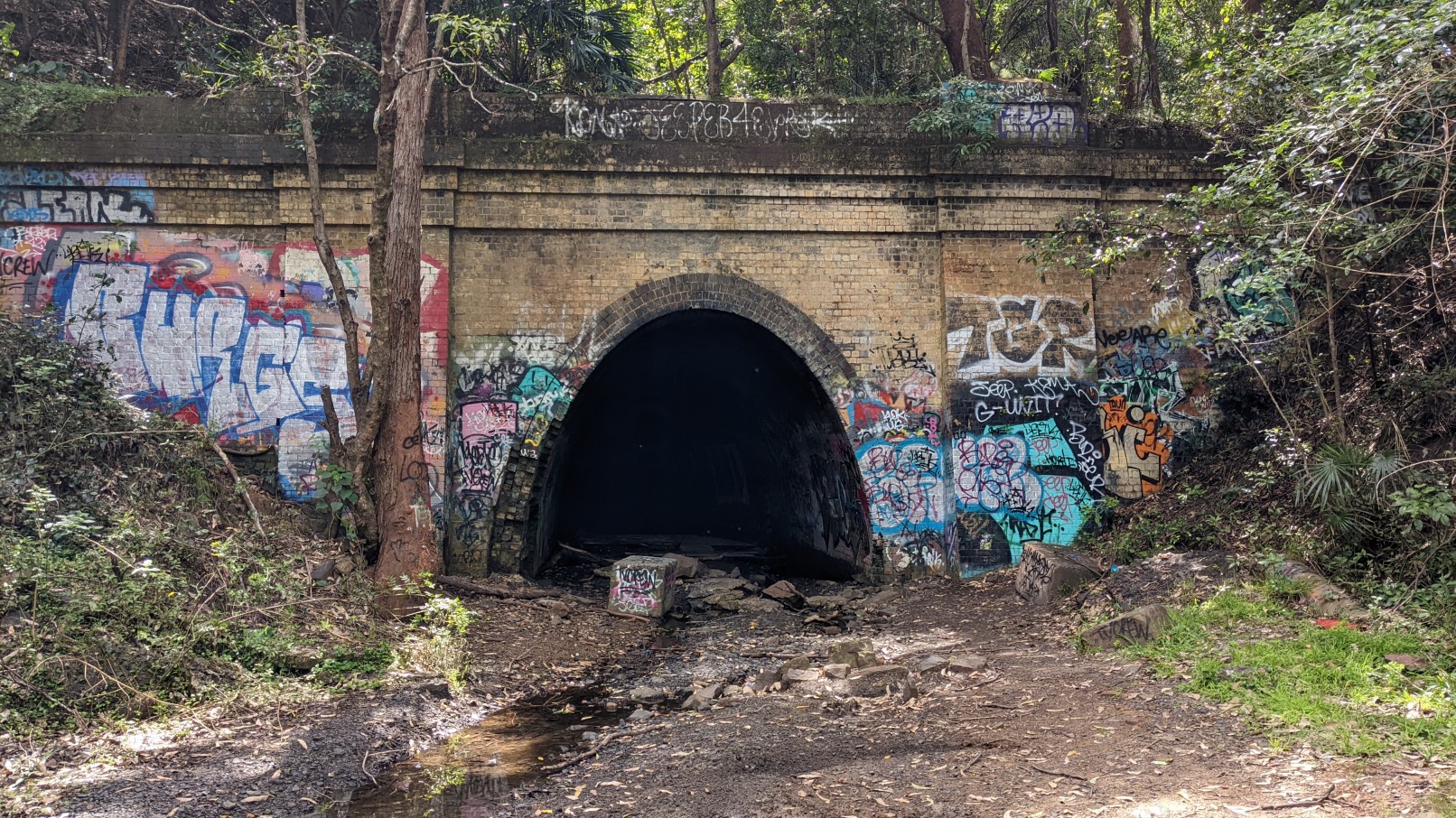

Leave a Reply